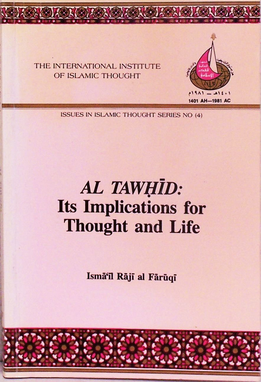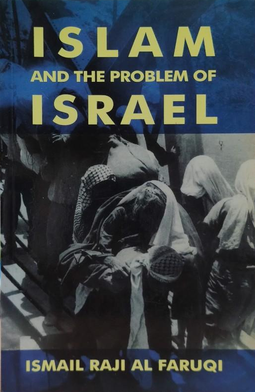Related Research Articles
The Islamization of Knowledge is a conceptual framework that originates from Islamic philosophy, advocating for the integration of Islamic teachings with modern academic disciplines, such as the social sciences, management sciences, humanities, sciences, engineering, and technology. This model posits that all knowledge and science should be consistent with the principles of Islam, aiming to foster a holistic understanding of the world through an Islamic worldview.

Christianity and Islam are the two largest religions in the world, with approximately 2.8 billion and 1.9 billion adherents, respectively. Both religions are Abrahamic and monotheistic, having originated in the Middle East.

Comparative religion is the branch of the study of religions with the systematic comparison of the doctrines and practices, themes and impacts of the world's religions. In general the comparative study of religion yields a deeper understanding of the fundamental philosophical concerns of religion such as ethics, metaphysics and the nature and forms of salvation. It also considers and compares the origins and similarities shared between the various religions of the world. Studying such material facilitates a broadened and more sophisticated understanding of human beliefs and practices regarding the sacred, numinous, spiritual and divine.

Religious ties between Muslims and the Jewish people have existed since the founding of Islam in the Arabian Peninsula in the 7th century; Muhammad's views on Jews were shaped by his extensive contact with the Jewish tribes of Arabia during his lifetime. Islam shares similar values, guidelines, and principles with the Jewish religion, and also incorporates Jewish history as a part of its own. Muslims regard the Israelites, to whom Jews and Samaritans trace their ethnic ancestry, as an important religious concept; they are referenced around 43 times in the Quran, excluding individual prophets, and in many accounts of hadith. Similarly, Moses, the most important Jewish prophet, is also regarded by Muslims as an Islamic prophet and messenger ; his name is mentioned in the Quran 136 times—more than any other individual—and his life is narrated and recounted more than that of any other prophet. The Torah, which is the compilation of the first five books of the Hebrew Bible, is also held by Muslims as an Islamic holy book that was revealed by God through various Israelite prophets and messengers. Later rabbinic authorities and Jewish scholars, such as Maimonides, engaged in discussions concerning the relationship between Islam and Jewish religious law. Maimonides himself, it has been argued, was influenced by Islamic legal thought while living in the caliphates of his time.
Christianity and other religions documents Christianity's relationship with other world religions, and the differences and similarities.

Interfaith dialogue, also known as interreligious dialogue, refers to cooperative, constructive, and positive interaction between people of different religious traditions and/or spiritual or humanistic beliefs, at both the individual and institutional levels.
Interfaith worship spaces are buildings that are home to congregations representing two religions. Buildings shared by churches of two Christian denominations are common, but there are only a few known places where, for example, a Jewish congregation and a Christian congregation share their home.
Monotheism—the belief that there is only one deity—is the focus of the Abrahamic religions, which like-mindedly conceive God as the all-powerful and all-knowing deity from whom Abraham received a divine revelation, according to their respective narratives. The most prominent Abrahamic religions are Judaism, Christianity, and Islam. They, alongside Samaritanism, Druzism, the Baháʼí Faith, and Rastafari, all share a common core foundation in the form of worshipping Abraham's God, who is identified as Yahweh in Hebrew and called Allah in Arabic. Likewise, the Abrahamic religions share similar features distinguishing them from other categories of religions:
The Abrahamic religions are a grouping of three of the major religions together due to their historical coexistence and competition; it refers to Abraham, a figure mentioned in the Hebrew Bible, the Christian Bible, and the Quran respectively, and is used to show similarities between these religions and put them in contrast to Indian religions, Iranian religions, and the East Asian religions. Furthermore, some religions categorized as "Abrahamic" also share elements from other categories, such as Indian religions, or for example, Islam with Eastern religions.
Coexist House is a charity for interfaith dialogue based at Inner Temple in London, England.

Isma'il Raji al-Faruqi was a Palestinian-American Muslim philosopher and scholar who worked extensively in Islamic studies and interfaith dialogue. He spent several years at Al-Azhar University in Cairo and taught at universities in North America, including McGill University in Montreal, Canada. Al-Faruqi was a professor of religion at Temple University, where he founded and chaired the Islamic Studies program. He also co-founded the International Institute of Islamic Thought (IIIT). Al-Faruqi authored more than 100 articles and 25 books, including Christian Ethics: A Historical and Systematic Analysis of Its Dominant Ideas (1967) and Al-Tawhid: Its Implications for Thought and Life (1982), examining Islamic thought, ethics, the concept of monotheism, and interfaith relations.

Yakov Meir Nagen is an Israeli rabbi and author. Nagen is a leader in interfaith dialogue and in particular interfaith peace initiatives between Judaism and Islam. He is the Director of the Blickle Institute for Interfaith Dialogue and the Beit Midrash for Judaism and Humanity. Nagen also teaches at Yeshivat Otniel and has written extensively about Jewish philosophy and Talmud.

Ataullah Siddiqui was a Muslim scholar and academic who did much to promote interfaith relations.

Andrew Thompson is an English Anglican priest, who has done extensive religious work with churches throughout the Middle East and North Africa region, currently based at St. Margaret's Church in Uxbridge, London Diocese. He is also an author, magician, and interfaith activist.

'Urubah and Religion: A Study of the Fundamental Ideas of Arabism and of Islam as Its Highest Moment of Consciousness (1962) is a scholarly work by Isma'il Raji al-Faruqi, published by Djambatan N.V. The book explores the concept of Arabism ('urubah), examining its historical, ethical, and spiritual dimensions, and its relationship with Islam. Al-Faruqi describes Arabism as central to Islamic history, culture, and faith, characterizing it as "the spirit which animates the stream and gives the momentum" to Islamic values.

Christian Ethics: A Historical and Systematic Analysis of Its Dominant Ideas (1967) is a scholarly work by Isma'il Raji al-Faruqi, first published in 1967. It explores Christian ethical thought from both historical and systematic perspectives, analyzing its development and key ideas. This work is part of a broader series by al-Faruqi that examines religious and ethical principles across different faiths. The book is noted for its critical stance on the development of Christian theological doctrines and its advocacy for a rational, coherent ethical framework. The publisher emphasized the unique value of this work as the first major Muslim attempt to examine Christian dogma and ethics on their terms. The book has been reviewed and critiqued by various scholars, including a notable review from a Christian perspective.
Meta-religion is a theoretical framework developed to compare and understand various world religions by identifying common principles and values that transcend individual traditions. It promotes a rational and critical examination of religious beliefs and practices, seeking a unified perspective that integrates diverse religious experiences. Scholars have used this concept to encourage dialogue between different faiths. In Islamic thought, meta-religion has been particularly influential, offering a way to harmonize varied religious experiences under a single, comprehensive framework.

The murder of the Faruqis occurred on May 27, 1986, at their home in Wyncote, Pennsylvania, United States. Isma'il Raji al-Faruqi, a prominent Islamic scholar, and his wife, Lois Lamya al-Faruqi, a respected art historian known for her contributions to ethnomusicology, were both killed in a brutal attack that drew significant attention due to their academic standing and the nature of the crime. Their daughter, Anmar el-Zein, who was eight months pregnant at the time, survived multiple stab wounds and managed to alert authorities despite severe injuries requiring 200 stitches. She described the assailant as a stocky man wearing a black scarf tied in a "cowboy-robber" style.

Al-Tawhid: Its Implications for Thought and Life is a book by Isma'il Raji al-Faruqi, first published in 1982. The work explores the central Islamic concept of Tawhid, the oneness and unity of God, and its implications for various aspects of life and thought.

Islam and the Problem of Israel is a book by Ismail Raji al-Faruqi, first published in 1980 by the Islamic Council of Europe. The book examines the historical and contemporary issues surrounding the state of Israel from an Islamic perspective.
References
- 1 2 Al-Faruqi, Isma'il Raji (1982). Trialogue of the Abrahamic Faiths. Washington, D.C.: International Institute of Islamic Thought. p. 88. OCLC 11470804.
- ↑ Hashi, Abdul Razak Abdulahi (August 5–7, 2008). Methodological Approach of Studying Religious Ethics of Other Faiths between Ismail al-Faruqi and Toshihiko Izutsu: A Comparative Study. International Conference on Contemporary Scholarship on Islam. Kuala Lumpur, Malaysia.
- 1 2 3 Sabri, Ahmad (2005). Understanding Isma'il Raji Al-Faruqi's Approach to Religious Pluralism and Ethics. Kuala Lumpur: IIUM Press. pp. 18–22.
- 1 2 Ganaie, Ab Majeed (2024). "Faith-Based Understanding: A Trialogic Perspective within the Abrahamic Religions". Lectures: Journal of Islamic and Education Studies. 3 (2): 136–148. doi: 10.58355/lectures.v3i2.82 .
- 1 2 3 4 Shaharud-din, Suhaida; Mohd Khambali, Khadijah (2012). "Analisis Konsep Abrahamic Faiths dan Kaitannya dengan Pluralisme Agama". International Journal of Islamic Thought (in Malay). 2 (1): 62–67. doi: 10.24035/ijit.2.2012.006 .
- ↑ Smith, Jane I. (2004). "Muslims as Partners in Interfaith Encounter". In Bukhari, Zahid H.; Nyang, Sulayman S.; Ahmad, Mumtaz; Esposito, John L. (eds.). Muslims' Place in the American Public Square: Hope, Fears, and Aspirations. Walnut Creek, CA: AltaMira Press. pp. 165–167. ISBN 9780759106130.
- ↑ Gul, Andleeb (2019). "Current Trends of Muslim Academia in Comparative Religions". Government College University, Lahore: 53–70.
- ↑ Abdul Rahman, Tasnim. "New Trends in Religious Study (Religiouswissenchaft): As Developed and Proposed by Al-Faruqi". World Applied Sciences Journal. 30: 15–18.
- 1 2 3 Hicks, Rosemary R. (2024). "Interfaith Endeavors: Building Alliances in Times of Crisis". Religious Pluralism, Secularism, and Interfaith Endeavors. Cambridge University Press. pp. 165–169.
- 1 2 Yousif, Ahmad F. (2017). Studies in World Religions: An Introduction to Monotheistic Traditions (2nd ed.). Bandar Seri Begawan: UNISSA Press. ISBN 9789991765464.
- ↑ Isma'il Raji al-Faruqi, ed. (1982). Trialogue of the Abrahamic Faiths. Beltsville, MD: Amana Publications. pp. 12–18. ISBN 9780915957255.
- ↑ Isma'il Raji al-Faruqi, ed. (1982). Trialogue of the Abrahamic Faiths. Beltsville, MD: Amana Publications. pp. 19–24. ISBN 9780915957255.
- ↑ Isma'il Raji al-Faruqi, ed. (1982). Trialogue of the Abrahamic Faiths. Beltsville, MD: Amana Publications. pp. 25–32. ISBN 9780915957255.
- ↑ Isma'il Raji al-Faruqi, ed. (1982). Trialogue of the Abrahamic Faiths. Beltsville, MD: Amana Publications. pp. 35–40. ISBN 9780915957255.
- ↑ Isma'il Raji al-Faruqi, ed. (1982). Trialogue of the Abrahamic Faiths. Beltsville, MD: Amana Publications. pp. 41–47. ISBN 9780915957255.
- ↑ Isma'il Raji al-Faruqi, ed. (1982). Trialogue of the Abrahamic Faiths. Beltsville, MD: Amana Publications. pp. 48–55. ISBN 9780915957255.
- ↑ Isma'il Raji al-Faruqi, ed. (1982). Trialogue of the Abrahamic Faiths. Beltsville, MD: Amana Publications. pp. 60–67. ISBN 9780915957255.
- ↑ Isma'il Raji al-Faruqi, ed. (1982). Trialogue of the Abrahamic Faiths. Beltsville, MD: Amana Publications. pp. 68–74. ISBN 9780915957255.
- ↑ Isma'il Raji al-Faruqi, ed. (1982). Trialogue of the Abrahamic Faiths. Beltsville, MD: Amana Publications. pp. 75–82. ISBN 9780915957255.
- ↑ Isma'il Raji al-Faruqi, ed. (1982). Trialogue of the Abrahamic Faiths. Beltsville, MD: Amana Publications. pp. 83–89. ISBN 9780915957255.
- ↑ Al-Faruqi, Isma'il Raji (1986). Trialogue of the Abrahamic Faiths (2nd ed.). Herndon, Va.: International Institute of Islamic Thought. ISBN 0912463066. OCLC 17803711.
- ↑ Al-Faruqi, Isma'il Raji (1991). Trialogue of the Abrahamic Faiths (3rd ed.). Alexandria, Va.; Herndon, Va.: Al Saʻdāwī Publications; International Institute of Islamic Thought. ISBN 0912463406. OCLC 23287132.
- ↑ Al-Faruqi, Isma'il Raji (1995). Trialogue of the Abrahamic Faiths (4th ed.). Beltsville, Maryland: Amana Publications. ISBN 9780915957255. OCLC 31970376.